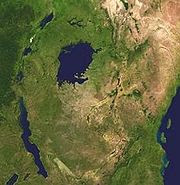Many people (well, at least two) have expressed confusion about the whole Lake Tanganyika / Zambia statement. Strangely enough those who know me have never questioned the "free range" or "child bride" statements; they choose to focus on the where rather than the who. From a South African perspective, I guess, it is in that part of the continent where maps are marked "Here be dragons" since the education system ignored anything between southern Europe and the Limpopo river for so very long.
Lake Tanganyika from space, courtesy Wikipedia. The bit on the far right of the picture is in Zambia
Lake Tanganyika is an African Great Lake (3° 20' to 8° 48' South and from 29° 5' to 31° 15' East). It is estimated to be the second or third largest freshwater lake in the world by volume, and the second deepest, after Lake Baikal in Siberia. The lake is divided between four countries – Burundi, Democratic Republic of the Congo (DRC), Tanzania and Zambia (Wikipedia again)
The African Great Lakes. Lake Tanganyika is bottom left, looks a little like Italy I've always thought
The problem with Wikipedia, of course, is that it's factual and dry and cannot possibly hope to do justice to the lake, which is the size of the United Kingdom. That's a fair bit of water (apparently one sixth of the world's freshwater) and when I was living there nobody knew how deep it was.
My dad ran a small game lodge called Kasaba Bay (http://africanadrenalin.co.za/Kasaba/) before the president of the day decided he'd quite like it as his personal holiday home.
The main lodge with the giant winterthorn tree
Can't fault his taste, and since it was a national lodge in a national park it wasn't as if it was ours to begin with. Sumbu National Park covers around 2,000 square kilometres - it's one of the smallest in Zambia and not well known at all.
My time at the lake was filled with fishing, exploring, adventures and trying to avoid radio school. To this day I have fond memories of Zambia (the sweet-tempered elephant who lived at the lodge) and I still wake up nights in a sweat having dreamt that Jack (the elephant who didn't like women) is sneaking up silently behind me to charge. Jack taught me that an elephant can hide behind a single blade of grass. I remember how my brother and I would scatter chicken bones outside the guests' chalets to attract hyenas and then giggle the next morning when they arrived - puffy-eyed and near hysterical - at breakfast to relate stories of man-eaters and werewolves.
I remain firmly convinced that there's no better way to grow up. Free-range indeed.
Tuesday, December 29, 2009
Subscribe to:
Post Comments (Atom)



No comments:
Post a Comment